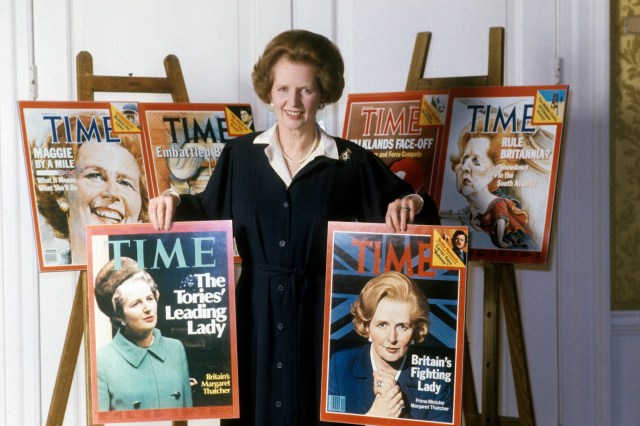Credit: PA/PA Archive/PA Images

“The problem with socialism,” said Margaret Thatcher, “is that eventually you run out of other people’s money.”
It’s a clever, multi-layered put-down, painting socialism as not only profligate, but also confiscatory and unsustainable.
However, as George Eaton explains in the New Statesman, the line has been modified and turned back against the Lady’s latter-day followers:
“The problem with Thatcherism is that you eventually run out of other people’s assets.”
The “assets” referred to here are the nationalised industries that the Thatcher governments privatised and the social housing that was sold to its tenants:
“In the 1980s Margaret Thatcher and her allies championed what they called ‘popular capitalism’. According to this theory, voters would be given a permanent stake in the market through the sale of council housing and shares in privatised utilities.
“And, for a period, it worked. The sale of more than a million council homes helped transform Labour voters into Tory loyalists. In 1984, shares in the privatised BT were 10 times oversubscribed, gifted a windfall to the government and voters. The sale of British Gas (exemplified by the populist ‘Tell Sid’ campaign), British Airways and the water companies followed. By the end of the 1980s, share ownership among the public had risen from seven per cent to a quarter.”
And yet, as Eaton points out, “‘popular capitalism’ has become unpopular capitalism” – with the companies running some of these privatised industries held in contempt by the public:
“By an overwhelming majority, voters favour the renationalisation of of the UK’s water (83 per cent), electricity (77 per cent), gas (77 per cent) and railways (76 per cent)”
I totally understand the public’s anger. As a regular user of Southern Railway’s train ‘service’, I feel it myself. However, we shouldn’t forget how badly run these businesses were before they were privatised. Their asset would be ruins without the investment they’ve received since privatisation – investment they were starved of when owned by the state. They may now be ‘cash cows’ for shareholders, but at least cash cows get looked after.
However, Eaton’s core argument is irrefutable: there’s nothing much left to privatise, therefore, in that key respect, a return to Thatcherism is impossible.
Arguably the most popular bit of popular capitalism – the right of council house tenants to buy their homes – wasn’t capitalist at all. What really made the Right to Buy fly was the hefty discount on the full market value of the property. The policy, therefore, was distributist not capitalist. Anti-statists might also like to note that the houses couldn’t have been sold if they hadn’t been built by previous governments.
If Margaret Thatcher’s heirs want to revive popular capitalism – or, more accurately, the ideal of a property-owning democracy, then their first priority must be the creation of new assets – and especially housing assets.
Government has the power to buy land cheaply, grant itself planning permission quickly, and have it developed beautifully. And, as I explain here, it can sell the houses through a Community Land Trust to help ordinary people become homeowners affordably.
Unlike, say, a pledge to increase funding for the NHS, this would be a policy on which the Conservatives can’t be outflanked by Labour.
The last thing that a socialist party needs is millions more people getting the chance to own their homes. To win power, the Left needs voters to be gratefully dependent on the state or resentfully dependent on private landlords. The re-democratisation of property ownership would be Margaret Thatcher’s dream and Jeremy Corbyn’s nightmare.










Join the discussion
Join like minded readers that support our journalism by becoming a paid subscriber
To join the discussion in the comments, become a paid subscriber.
Join like minded readers that support our journalism, read unlimited articles and enjoy other subscriber-only benefits.
Subscribe